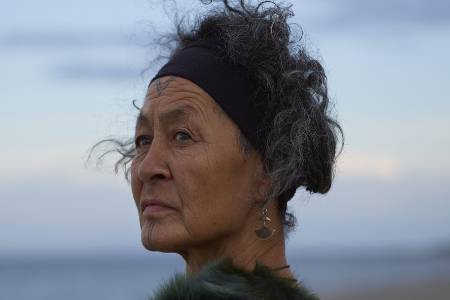Danish filmmaker Lin Alluna first met renowned Greenlander Inuit lawyer Aaju Peter by coincidence seven years ago in Copenhagen. In their initial coffee meeting, Aaju “revealed hidden truths aboutmyself and the history of my country, that I knew I had to find a way to share.” It was at this time that the seed was planted to work on this documentary together, TWICE COLONIZED.
Aaju has led a lifelong fight for the rights of her people. When her son suddenly dies, Aaju embarks on a journey to reclaim her language and culture after a lifetime of whitewashing and forced assimilation.
In TWICE COLONIZED, we are taken on a deeply personal journey alongside Aaju. We see her diligently at work on advocating for the rights of Indigenous people in Canada, Greenland and Europe. At the same time, we also see Aaju at her most vulnerable – alone at home or with friends and family.
It is clear throughout the film that Aaju felt immensely comfortable with Lin filming her and following her for the extent of seven years. Yes, that is right… seven years. Lots happens during this time which propel Aaju into channeling her grief, pain, happiness, and strength into becoming the person she has been envisioning herself to be. As she states in the film, “in your life, your experience is your power.”
There is so much to appreciate in this film. Firstly, Aaju’s willingness to share herself with the rest of the world – as a means to show us the effects of colonization have and continue to have on Indigenous people. Through her personal experiences and her work, we come to understand the need to have a continuous dialogue with those directly impacted by decisions imposed upon by governments without consultation. The film reminds us of Denmark’s colonial history and also portrays some of the present day effects of colonization in both Europe and Canada to the world.
Secondly, we have the efforts of Lin and producer Emile Hertling Péronard, who worked diligently to make this film as ethically and creatively sustainable both behind and in front of the camera. This allowed the opportunity to produce the film with Alethea Arnaquq-Baril (director of Angry Inuk) and Stacey Aglok (producer of The Grizzlies and others) ensuring an Inuit led production. TWICE COLONIZED will be the first formal co-production between Inuit from Greenland and Canada, making it an example of decolonization in that colonial borders were non-existent in the process of making the film.
Thirdly, the entire production team. It is clear that being a co-production allowed the luxury of working with cinematographers like Iris Ng, Glauco Bermudez and David Bauer who each added their own personal touch to the film and lifted the visual aspects of the film. There is also editor Mark Bukdahl, who also had to infuse the film with emotional storytelling complemented by the footage. The film’s subtle yet emotional score was composed by Olivier Alary and Johannes Malfatti.
I leave you with my conversation with Aaju Peter and director Lin Alluna who candidly shared more about their seven year experience making this film.
TWICE COLONIZED premiered at Sundance earlier this week. It has left me with plenty to think and talk about, and hope the same applies to audiences who view the film. To follow the film’s journey and support Aaju’s work, please visit twicecolonized.com.






